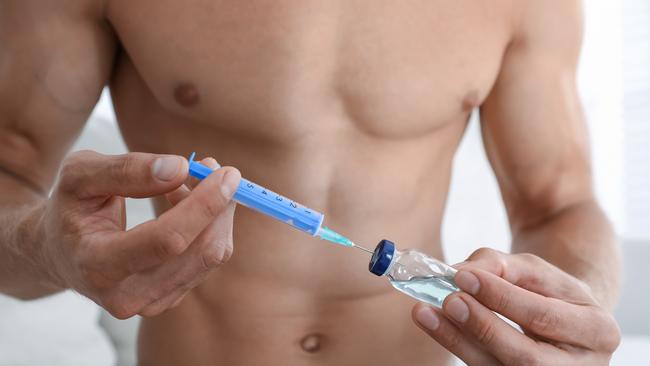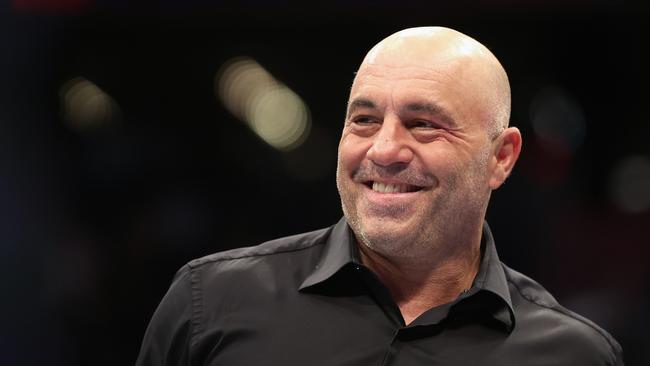Alert over jabs hailed by ‘manosphere’
Testosterone is pushed by online clinics and social media stars to boost mood and sex drive. Doctors fear that there are not enough warnings about the risks.

Ali seems like a friendly chap, the kind of bloke who is easy to chat to in the pub. But until recently, the 34-year-old admits, he had been finding life a bit hard. “I was really struggling with low mood, low energy,” he quietly confesses in an online video. “I had low sex drive at the time. I had really poor sleep. And I was just really struggling at work every day.”
The problem, Ali explains in the video, which is appearing in the social media feeds of countless British men, was low testosterone. “As soon as I started treatment it was almost immediate.”
Men in their thirties and forties are increasingly being exposed to social media adverts, paid for by companies to fill Instagram and Facebook feeds. The solution they offer is testosterone replacement therapy (TRT), which is self-injected into the body or applied via creams and gels.
Low testosterone levels, according to the adverts, are responsible for everything from low mood to a raised risk of dementia. To its supporters, including key “manosphere” influencers such as the world’s most popular podcaster, Joe Rogan, who has talked about taking testosterone, TRT improves concentration, boosts fitness, clears brain fog and gives men back their “oomph”.
But some doctors warn that it has severe side-effects, such as infertility. Once men start taking it, they warn, they might be forced to take it for life. When testosterone is artificially introduced, it stops the body producing the hormone naturally, which also stops the body’s production of sperm. In most men, this is reversed when they stop taking TRT, but for some it is permanent. Testosterone supplementation has long been prescribed on the NHS to men with hypogonadism, a medical syndrome where the body produces extremely low levels of the hormone. But as part of a trend that started in the US and is now taking hold in the UK, a wave of online TRT clinics are recommending it for a wide and vague range of symptoms, including low mood and sleep problems.
“Let’s face it, most of us feel these things at some point, particularly Monday morning,” said Dr Channa Jayasena, a consultant in reproductive endocrinology at Imperial College London. “There are many, many things that make us depressed and tired. [Low] testosterone is one of them. [The companies] are highlighting very non-specific symptoms to funnel in guys to get tested, and some of them will get started on testosterone.”
Jayasena said that for some men, TRT is vital. He regularly prescribes it on the NHS, particularly for men who suffer with erectile dysfunction and low libido.
But he said many private clinics are now taking things too far, promoting it as “the elixir of life”. He said: “Some private clinics are giving higher doses of testosterone than should be given. They’re going off-piste and almost popularising testosterone treatment. I spend a lot of my time speaking to young men and trying to undo things they have been told or they’ve read.”
TRT started increasing in popularity in the US about a decade ago among men in their fifties and sixties, with clinics promoting it as a solution to the so-called “male menopause” or “andropause”, a problem said to be linked to low energy levels and virility.
Most NHS doctors say this does not exist. While testosterone naturally declines with age - about 1 per cent a year after the age of 40 - there is no sudden drop-off equivalent to the menopause in women, when oestrogen and progesterone levels plummet suddenly.
In recent years private companies promoting the treatment - increasingly active in the UK - have started targeting younger men. One of the main factors behind the shift was a series of studies that showed previous fears about the heart attack and stroke risks of taking testosterone were unfounded. “Private clinics now feel it’s open season to market testosterone,” Jayasena said.
But there are other risks associated with the treatments.
The British Society for Sexual Medicine says in its guidelines: “If a man wishes to father children in the near future, then the risk of testosterone therapy on fertility needs to be discussed.” Patrick Gordon, a consultant urologist and andrologist at Leeds Teaching Hospitals, said: “If you start it, you might be on it for ever and, in a small percentage of patients, it could potentially make you infertile for ever. They don’t say that in the adverts.
“A certain percentage of these men who are younger, they come and see me five, ten years later having stopped testosterone replacement and they’re still infertile. Testosterone is dangerous in the wrong hands.”

For men with undiagnosed prostate cancer, taking additional testosterone can also accelerate tumour growth.
“You need to rule out prostate cancer right from the start,” Gordon said. “So everyone I start on testosterone needs to have a digital rectal exam to feel their prostate. A lot of these men being started on testosterone online, no one is examining them.”
For many men, Gordon said, TRT is unnecessary. “How this is diagnosed is quite poor. So a lot of these are done by finger-prick blood tests. To get an accurate low testosterone reading, it needs to be done before 9am and after fasting. Often these are done inaccurately ... so you’ll get an abnormally low reading.” But he added: “If someone does have low testosterone, it doesn’t necessarily mean they need testosterone replacement.” Many men have low testosterone because they are overweight or diabetic. “Let’s concentrate on sorting your diabetes out first, rather than looking at testosterone replacement.”
One of the companies selling the product is Manual, which has raised pounds 50 million in fundraising. Other providers in the UK include Numan and Optimale.
A quiz on Manual’s website asks users to “answer ten quick questions to assess if low testosterone could be holding you back”. They include: “Do you have a lack of energy?” and “Are you sad and/or grumpy?” Answering yes to just one of these presents an “assessment” that says: “Your responses indicate low testosterone ... you could reach normal healthy levels in six weeks.”
The plan begins with an at-home testosterone blood test costing pounds 33.95, after which a “second, more comprehensive blood test” is sent out.
The company explains: “If both tests show that you have low T levels, you’ll discuss suitable treatment options with one of our doctors and during an in-depth consultation before starting treatment.” UK advertising rules ban direct marketing of prescription drugs. Manual does not name drugs on its website.
Dr Jeff Foster, a GP and director of men’s health at Manual, defended the use of social media advertising. “Whether it is via social media or an NHS advert should not stop men from getting access to a medicine that can improve the quality and long-term health outcomes for men,” he said, adding: “In young men who need TRT but have not completed their family, we do not use testosterone at all and use similar treatments that increase natural production of testosterone such as clomiphene or HCG [human chorionic gonadotropin].”
He also disputed the claim that some men could be forced to take TRT for life, pointing to evidence that suggests where the treatment causes infertility “it is reversible in 60-70 per cent of men within 12 months”. Fertility outcomes can be improved further by using other medicines at the same time, he said.
Members of the “manosphere”, the loose collection of macho influencers in the US who helped propel President Trump back to power in November, frequently laud testosterone and its supposed beneficial effects.

Rogan, 57, is one of them, regularly discussing the topic on The Joe Rogan Experience, considered the world’s most popular podcast. “I started [TRT] when I was 40; it makes a big difference,” he said in 2018 in a clip that has been watched more than two million times. “TRT exists for a reason. It makes you feel way better, it makes your body work way better.”
The British pop star Robbie Williams, 51, has spoken about his low libido after stopping testosterone, which he used to treat depression.
Darby Saxbe, professor of psychology at the University of Southern California, said: “There is a weird testosterone fascination at the moment that I personally consider to be quite problematic. I think there’s a huge misunderstanding about testosterone in popular culture - there’s an idea that in absolute terms you always want it to be high, but that actually is a terrible idea.”
She added that mothers whose partners have higher testosterone report “more intimate partner aggression” and men report more parenting stress.
Carole Hooven, an evolutionary biologist at Harvard, said the popularity of TRT was linked to a crisis in masculinity. “We expect men to fight and be tough and strong and to protect our families and protect our countries. But those are also the qualities we punish men for and that we label as toxic,” she said. “I wonder if what we’re seeing now is a backlash because we have these shamelessly masculine leaders, and men now have permission to really assert their version of masculinity.”
The Times




To join the conversation, please log in. Don't have an account? Register
Join the conversation, you are commenting as Logout